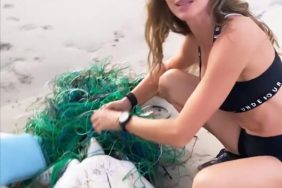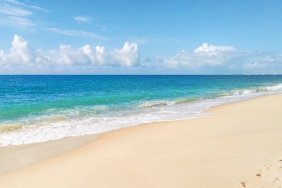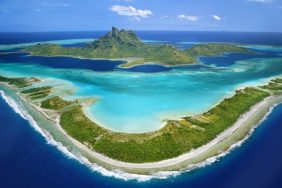A few weeks ago I had the good fortune of taking part in a press trip to the Philippines islands on a Reef Check expedition, sponsored by Malibu Rum. That’s right, a liquor company sponsored a tropical diving trip for a bunch of pampered writers. Jealous yet?

Reef Check, a non-profit dedicated to preserving coral reefs worldwide, recognizes that coral reefs are the canary in the coal mine of oceanic health, and there is a clearly defined synergistic impact between the health of our oceans and the rest of the world. They’re drawing attention to the cause by getting in the water and playing a key part in the preservation rather than throwing the typical stale, hard-sell fundraisers that are the standard for most charitable causes. After all, while the reefs are struggling terribly, they aren’t exactly the most cuddly charity one can imagine; you can’t quite hug a sea urchin, and Steve Irwin pretty much ruined any chance of the sting ray plush-toy craze catching on. So that hurdle raised the question: what would be an ideal company to partner up with in bringing attention to protecting the reefs? In hindsight, it seems like a no-brainer: Malibu Rum.
The Malibu/Reef Check partnership led us to the Philippines, long considered the “center of the center” of global marine biodiversity and an aquatic utopia for divers. After a hearty beachside breakfast each morning, we trained in standard EcoDiver monitoring protocol with Dr. Gregor Hodgson (Founder/Executive Director of Reef Check and all-around incredible human being) before heading out on our own to explore the gorgeous reefs of Puerto Galera, an island about three hours south of Manila.

As the uninitiated floundered, puked and otherwise struggled to get used to the scuba/snorkel gear (who, me?), the rest of us were immediately rewarded for our seemingly-endless travel by some of the most marvelous underwater views imaginable.

Experiencing the ultra-high diversity among the Philippines reefs was literally breathtaking – I know this personally, having had the great pleasure of gasping at a sweetlip fish swimming nearby and sucking half a pint of seawater into my lungs.
While some took oxcart trips through the hillsides and others enjoyed beachside massages to pass the free time, everyone found their own little slice of paradise diving among the reefs, and developed at least a passing understanding of the delicate environmental balance that so many species rely upon. Seeing the cost of human impact up close was both troubling and inspiring.
Don’t ask how many cases of Malibu we went through (the company was kind enough to plan ahead) or how the majority of our group inadvertently found themselves dancing in a whorehouse one night (it doubles as a bar, apparently), but I will tell you that at some point in the sweltering madness I won a cocktail competition for a concoction that consisted almost entirely of the sponsor’s product. Can’t go wrong there, I guess. And Jesus look at the food…

Giant prawns. Magically delicious.
Needless to say, the experience was a fantastic thrill – but it served as a disquieting eye-opener as well: Twenty-five percent of the entire world’s species can be found on barrier reefs, and recent findings have suggested that there is great medicinal potential among the species found therein. Unfortunately, many of the most common species found 30 years ago have already become endangered or extinct due to overfishing, global warming, poor waste regulations and environmental standards. There is a very real danger facing these tropical coastlines as a result: Barrier reefs bear the name because they protect the shoreline from big waves. As the reefs break down, the tides move in further and hammer the beach, eroding the shoreline and driving civilization inland.
Do what I did – for free!
Until August 31, you can win a trip to do the same thing I did. The Malibu/Reef Check partnership have launched the ultimate beach internship, where 10 winners will have a chance to monitor coral reef health in the utterly stunning reefs of Thailand, the Maldives, or the Philippines. Airfare, room and board are included, and while you’re getting SCUBA certified in paradise you can revel in the knowledge that you’re helping save the world.
Malibu is utilizing this perfect matchup with Reef Check to reach out to their young, eco-aware fans and offering them a chance to become a Malibu Beach Intern. To celebrate the partnership and contest, they’ve unveiled a limited-edition Malibu bottle:

“The Malibu Beach Internship provides a perfect opportunity to make saving the world just another day at the beach,” says Lisa McCann, Senior Brand Manager for Malibu (and master snorkeler). “We know that beaches and reefs are inextricably linked, so the partnership with Reef Check was a natural fit; the organization truly embodies the ideal of engaging the world in a fun and positive way while making a concerted difference.”

“What we love about the Malibu/Reef Check Partnership is that it is very real – with on-the-ground training in reef monitoring – the core of the Reef Check program,” said Dr. Hodgson. “With Malibu’s help we can reach out to so many thousands of young people and engage them in marine conservation.”
If you don’t win, however, there’s still plenty you can do to get involved. On a minimal level, you can simply avoid buying exotic sea shells, exotic ocean fish, or food from places that use blast fishing (which is exactly what it sounds like – fishing with dynamite). You can also join five former presidents by electronically signing Reef Check’s Declaration of Reef Rights.
If you’re feeling a little more generous, you can check out the Reef Check website, donate $10 to support the group’s conservation programs and sign up for their online newsletter.
If you want to do it on your own, you can sign up for Reef Check Training on your next beach vacation.









